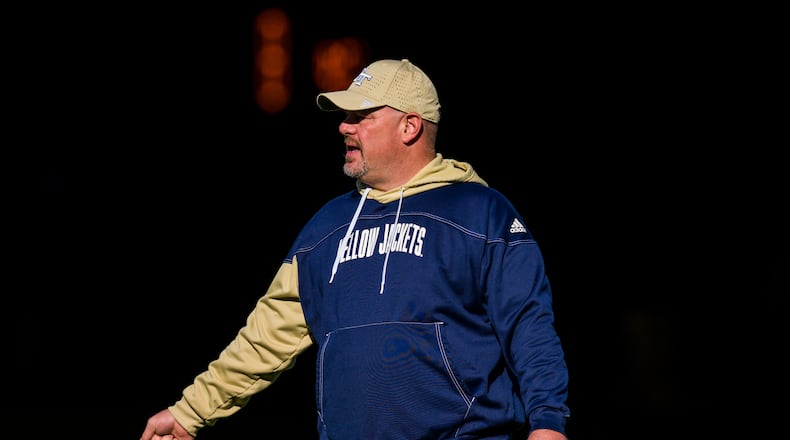Georgia Tech coach Brent Key is banking on a defensive shakeup turning into a defensive turn-up.
Key reorganized duties on his defensive staff Sunday, the fallout from a 38-27 loss at home to Bowling Green the day before and the residual of poor defensive performances throughout the season so far. The first-year coach moved defensive coordinator Andrew Thacker to safeties coach and moved Kevin Sherrer, the team’s linebackers coach and co-defensive coordinator, into the defensive coordinator position.
On Tuesday, Key spoke publicly for the first time about the changes.
“I felt that it was the right time to make a change, to have a new voice, to have a new type of energy leading the group on defense,” Key explained. “Wasn’t a knee-jerk reaction. Like everything, it’s something that we evaluate every week, evaluate all three sides of the ball and the coaches and all the players.
“At the end of the day, performance is what matters. That’s where we stand, and that’s why a decision was made to make an adjustment to change on the defensive side of the ball.”
Tech’s defense may have been expected to be a strength for the Yellow Jackets (2-3, 1-1 ACC) before the season kicked off Sept. 1. Thacker returned an experienced secondary, had depth along the defensive line and had a host of talented transfers at linebacker.
The Jackets also ended the 2022 season relatively strong at times, with wins over Pittsburgh, Duke, Virginia Tech and North Carolina in which the defense allowed a modest 21.3 points and 339.5 yards of offense per game. Tech also had nine takeaways in those wins.
But the positive momentum hasn’t carried over to 2023.
The Jackets are allowing more than 29.4 points per game (39.3 in three losses) and 427.8 yards per contest. And Saturday against Bowling Green, the bottom fell out, with the Falcons scoring on all five red-zone trips, converting 10 third downs and devouring almost 43 minutes of game clock, nearly a record against a Tech-led defense – and the last game under Thacker’s direction.
“It’s been an ongoing evaluation of every side of the football, week-to-week after every game, that I make. So it was not a knee-jerk reaction by any means,” Key said.
Sherrer came to Tech in January, signing a two-year contract for an annual base salary of $450,000 to be the program’s co-defensive coordinator and linebackers coach. An Alabama native who played tight end at Alabama from 1993-95, Sherrer was a long-time high school coach in his home state before joining Alabama’s staff in 2012.
Sherrer spent four seasons at Georgia, under Mark Richt for two seasons and then Kirby Smart, before moving to Tennessee to join Jeremy Pruitt’s staff. After two seasons with the New York Giants in the NFL, first-year coach Brian Daboll chose not to retain Sherrer for the 2022 season.
Tech quarterbacks coach Chris Weinke coached with Sherrer, who spent the 2022 season away from coaching, at Tennessee. Sherrer was one of Key’s first assistant coach hires in January.
“There are some things that have gone on in this defensive system here at Tech that are new to me,” Sherrer told The Atlanta Journal-Constitution in March. “So it’s constant learning. As a coach, you’re constantly trying to gain knowledge. So I’m trying to gain knowledge from (Thacker) and his understanding and his approach, coach Key’s approach to the overall program and help just give my opinion of that now. And then, obviously, once we get into the season, there’ll be things that he and I may sometimes discuss, talk about, what we feel like the best thing to do is. Yeah, it’s important to have a good relationship, and so far it’s been great.”
Key picked a heckuva time to switch up things, staring down the barrel of a week that features No. 17 Miami at the end of it. The Hurricanes (4-0, 0-0 ACC) are well-rested after a bye week and have one of the nation’s better quarterbacks, in terms of passing efficiency (197.8) and passing touchdowns (11), in Tyler Van Dyke. Miami’s offense ranks seventh nationally in total offense (519 ypg), rushing offense (222.5 ypg) and third-down offense (50 percent).
Miami’s 43.8 points per game is the eighth-best mark in college football.
Sherrer will try to get the Jackets in position to slow Miami’s offense while calling defensive plays on the sideline. Thacker will move to a coaching booth during games, Key said, and assist in coaching the team’s safeties, secondary and special teams during the week of practice.
Key informed Sherrer, Thacker and the rest of the staff of his decision Sunday before announcing to the team what changes had been made. The Jackets then resumed practice Tuesday morning.
“Our job as coaches is to put the players in the best position and to be able to make plays on both sides of the football,” Key said. “That’s what our job is and to teach them to do the right things and to have things repped in practice that we’re going to go into the game (with) and be able to have high confidence that we’re going to be in position to make those plays.”
About the Author
Keep Reading
The Latest
Featured


